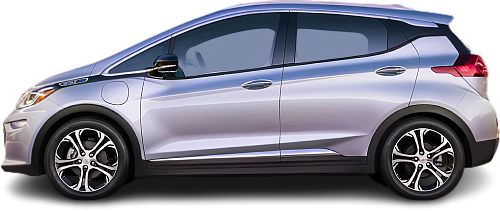Global EV Comparison: Chevrolet Bolt EV Gen 1 vs Porsche Taycan Turbo S
Struggling to Decide? Let AI Help!
Your AI Summary Is Ready!
General Info
Since both vehicles have been discontinued, they are now only available on the used car market. You can get the Porsche Taycan Turbo S (2020-2024) for as low as €80000, while the Chevrolet Bolt EV Gen 1 (2017-2019) was never offered for sale in Europe.
The Chevrolet Bolt EV Gen 1 (2017-2019) is a Hatchback, whereas the Porsche Taycan Turbo S (2020-2024) is a Sedan.
| Property | Chevrolet Bolt EV Gen 1 | Porsche Taycan Turbo S |
|---|---|---|
| Years of Production | 2017-2019 | 2020-2024 |
| Current Status | Discontinued | Discontinued |
| Country of Manufacture | USA | Germany |
| Body Style | Hatchback | Sedan |
| Market Availability | USA | EU, USA |
| Price Europe (Used) | - Price Europe (Used) | €80000 |
| GCC Score | 5.1 | 6.5 |
Range and Efficiency
While the Porsche Taycan Turbo S (2020-2024) offers a longer real-world range and a bigger battery, it is less energy-efficient than the Chevrolet Bolt EV Gen 1 (2017-2019).
| Property | Chevrolet Bolt EV Gen 1 | Porsche Taycan Turbo S |
|---|---|---|
| Range (EPA) | 383 km | 357 km |
| Range (WLTP) | - Range (WLTP) | 468 km |
| Range (GCC) | 364 km | 378 km |
| Battery Capacity (Nominal) | 60 kWh | 93.4 kWh |
| Battery Capacity (Usable) | 57 kWh | 83.7 kWh |
| Efficiency per 100 km | 15.7 kWh/100 km | 22.1 kWh/100 km |
| Efficiency per kWh | 6.39 km/kWh | 4.52 km/kWh |
| Range and Efficiency Score | 7 | 5.2 |
Charging
The Porsche Taycan Turbo S (2020-2024) features an advanced 800-volt architecture, whereas the Chevrolet Bolt EV Gen 1 (2017-2019) relies on a standard 400-volt system.
The Porsche Taycan Turbo S (2020-2024) offers faster charging speeds at DC stations, reaching up to 268 kW, while the Chevrolet Bolt EV Gen 1 (2017-2019) maxes out at 50 kW.
The Porsche Taycan Turbo S (2020-2024) features a more powerful on-board charger, supporting a maximum AC charging power of 11 kW, whereas the Chevrolet Bolt EV Gen 1 (2017-2019) is limited to 7.2 kW.
| Property | Chevrolet Bolt EV Gen 1 | Porsche Taycan Turbo S |
|---|---|---|
| Max Charging Power (AC) | 7.2 kW | 11 kW |
| Max Charging Power (DC) | 50 kW | 268 kW |
| Architecture | 400 V | 800 V |
| Charge Port | CCS Type 1 | CCS Type 2 |
| Charging Score | 4.3 | 7.9 |
Performance
The Chevrolet Bolt EV Gen 1 (2017-2019) is front-wheel drive, while the Porsche Taycan Turbo S (2020-2024) offers an all-wheel drive system.
The Porsche Taycan Turbo S (2020-2024) boasts greater motor power and accelerates faster from 0 to 100 km/h.
| Property | Chevrolet Bolt EV Gen 1 | Porsche Taycan Turbo S |
|---|---|---|
| Drive Type | FWD | AWD |
| Motor Type | PMSM | PMSM (front), PMSM (rear) |
| Motor Power (kW) | 150 kW | 560 kW |
| Motor Power (hp) | 201 hp | 751 hp |
| Motor Torque | 360 Nm | 1050 Nm |
| 0-100 km/h | 7.2 s | 2.8 s |
| Top Speed | 146 km/h | 260 km/h |
| Performance Score | 3.5 | 7.9 |
Dimensions
The Porsche Taycan Turbo S (2020-2024) is longer and wider, but the Chevrolet Bolt EV Gen 1 (2017-2019) is taller.
The Porsche Taycan Turbo S (2020-2024) boasts a more extended wheelbase.
| Property | Chevrolet Bolt EV Gen 1 | Porsche Taycan Turbo S |
|---|---|---|
| Length | 4166 mm | 4963 mm |
| Width (with Mirrors) | 2039 mm | 2144 mm |
| Width (w/o Mirrors) | 1765 mm | 1966 mm |
| Height | 1595 mm | 1378 mm |
| Wheelbase | 2601 mm | 2900 mm |
Cargo and Towing
A frunk (front trunk) is available in the Porsche Taycan Turbo S (2020-2024), but the Chevrolet Bolt EV Gen 1 (2017-2019) doesn’t have one.
Neither vehicle is officially rated for towing in in the EU.
| Property | Chevrolet Bolt EV Gen 1 | Porsche Taycan Turbo S |
|---|---|---|
| Number of Seats | 5 | 5 |
| Curb Weight | 1624 kg | 2370 kg |
| Cargo Volume (Trunk) | 479 l | 366 l |
| Cargo Volume (Max) | 1603 l | - Cargo Volume (Max) |
| Cargo Volume (Frunk) | - Cargo Volume (Frunk) | 84 l |
| Towing Capacity | - Towing Capacity | - Towing Capacity |
| Cargo and Towing Score | 4.7 | 4.9 |




